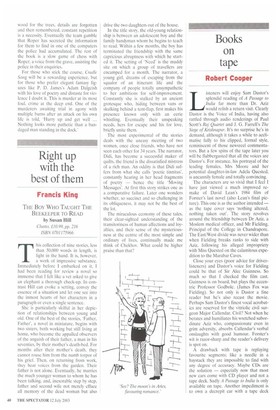Right up with the best of them
Francis King
THE Bo Y WHO TAUGHT THE BEEKEEPER TO READ by Susan Hill Chatto, £10.99. pp. 216 ISBN 0701175966 This collection of nine stories, less than 50,000 words in length, is light in the hand. It is, however, a work of impressive substance. Immediately before I embarked on it, I had been reading for review a novel so immense that I felt like a vet asked to give an elephant a thorough check-up. In contrast Hill can evoke a setting, convey the essence of a situation and let one see into the inmost hearts of her characters in a paragraph or even a single sentence.
She is particularly skilful in her depiction of relationships between young and old. One of the best of the stories, 'Father. Father', a novel in miniature, begins with two sisters, both working but still living at home, who become the appalled observers of the anguish of their father, a man in his seventies, by their mother's death-bed. For months after their mother's death, they cannot rouse him from the numb torpor of his grief. Then, on returning from work, they hear voices from the garden. Their father is not alone. Eventually, he marries the much younger woman to whom he has been talking, and, inexorable step by step, father and second wife not merely efface all memory of the dead woman but also drive the two daughters out of the house.
In the title story, the old-young relationship is between an adolescent boy and the family handyman whom he begins to teach to read. Within a few months, the boy has terminated the friendship with the same capricious abruptness with which he started it. The setting of 'Need' is the muddy site on which a group of travellers are encamped for a month. The narrator, a young girl, dreams of escaping from the squalor of an itinerant life and the company of people totally unsympathetic to her ambitions for self-improvement. Constantly she is stalked by an ancient grotesque who, hiding between vans or skulking behind a tent-flap, first makes his presence known only with an eerie whistling. Eventually their unspeaking needs, hers for escape and his for love, briefly unite them.
The most experimental of the stories deals with the uneasy meeting of two women, once close friends, who have not seen each other for 34 years. The narrator, Didi, has become a successful maker of quilts, the friend is the dissatisfied mistress of a rich man. An oddity is that Didi suffers from what she calls 'poetic tinnitus', constantly hearing in her head fragments of poetry hence the title 'Moving Messages'. At first this story strikes one as a comparative failure. Later one wonders whether, so succinct and so challenging in its obliqueness, it may not be the best of the lot.
The miraculous economy of these tales, their clear-sighted understanding of the transitoriness of human affections and loyalties, and their sense of the mysteriousness at the centre of the most simple and ordinary of lives, continually made me think of Chekhov. What could be higher praise than that?


































































 Previous page
Previous page